
Sōtō Zen or the Sōtō school is the largest of the three traditional sects of Zen in Japanese Buddhism. It is the Japanese line of the Chinese Cáodòng school, which was founded during the Tang dynasty by Dòngshān Liánjiè. It emphasizes Shikantaza, meditation with no objects, anchors, or content. The meditator strives to be aware of the stream of thoughts, allowing them to arise and pass away without interference.
Engaged Buddhism, also known as socially engaged Buddhism, refers to a Buddhist social movement that emerged in Asia in the 20th century. It is composed of Buddhists who seek to apply Buddhist ethics, insights acquired from meditation practice, and the teachings of the Buddhist dharma to contemporary situations of social, political, environmental, and economic suffering, and injustice.
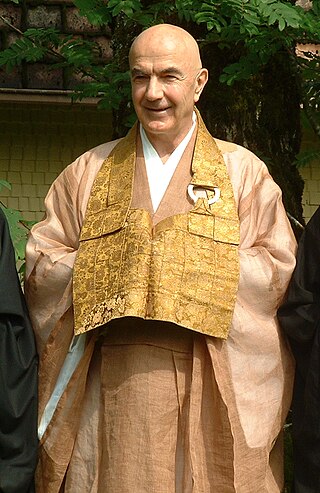
Richard Dudley Baker is an American Soto Zen master, the founder and guiding teacher of Dharma Sangha—which consists of Crestone Mountain Zen Center located in Crestone, Colorado and the Buddhistisches Studienzentrum (Johanneshof) in Germany's Black Forest. As the American Dharma heir to Shunryu Suzuki, Baker assumed abbotship of the San Francisco Zen Center (SFZC) shortly before Suzuki's death in 1971. He remained abbot there until 1984, the year he resigned his position after it was disclosed in the previous year that he and the wife of one of SFZC's benefactors had been having an affair. Despite the controversy connected with his resignation, Baker was instrumental in helping the San Francisco Zen Center to become one of the most successful Zen institutions in the United States.

San Francisco Zen Center (SFZC), is a network of affiliated Sōtō Zen practice and retreat centers in the San Francisco Bay area, comprising City Center or Beginner's Mind Temple, Tassajara Zen Mountain Center, and Green Gulch Farm Zen Center. The sangha was incorporated by Shunryu Suzuki Roshi and a group of his American students in 1962. Today SFZC is the largest Sōtō organization in the West.
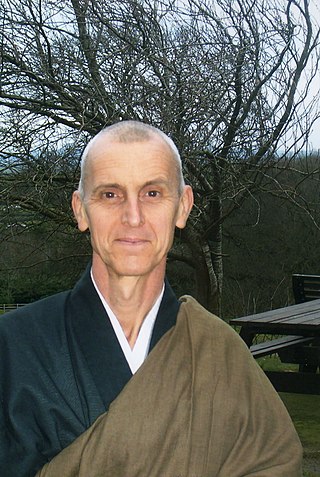
Ryushin Paul Haller, a Soto Zen roshi, is a former abbot of the San Francisco Zen Center—a position he held from 2003 until February 2012. Leaving his homeland of Belfast in Northern Ireland in the early 1970s, Haller spent time in Russia, Afghanistan and Japan. He then went to Thailand for two years where he was ordained as a Buddhist monk. Coming to California in 1974, he entered Tassajara Zen Mountain Center and was later ordained as a priest by Zentatsu Richard Baker in 1980. He received shiho from Sojun Mel Weitsman in 1993, giving him authority to teach. Since 2000 Haller has also been the teacher of Black Mountain Zen Centre in Belfast, Northern Ireland.
The Buddhist Peace Fellowship (BPF) is a nonsectarian international network of engaged Buddhists participating in various forms of non-violent social activism and environmentalism. The non-profit BPF is an affiliate of the international Fellowship of Reconciliation working toward global disarmament and peace, helping individuals suffering under governmental tyranny in places such as Burma, Bangladesh, Tibet and Vietnam. Headquartered in Oakland, California, BPF was incorporated in 1978 in Hawaii by Robert Baker Aitken, his wife Anne Hopkins Aitken, Nelson Foster, Ryo Imamura and others. Shortly after other notable individuals joined, including Gary Snyder, Alfred Bloom, Joanna Macy, and Jack Kornfield. Generally speaking, the BPF has a tendency to approach social issues from a left-wing perspective and, while the fellowship is nonsectarian, the majority of its members are practitioners of Zen Buddhism.
BPF's work includes:
- Sparking conversation at the intersection of Buddhism and social justice;
- Training Buddhist political activists;
- Mobilizing people to action from a Buddhist perspective;
- Building a network of radical Buddhist activists.

Bernie Glassman was an American Zen Buddhist roshi and founder of the Zen Peacemakers, an organization established in 1980. In 1996, he co-founded the Zen Peacemaker Order with his late wife Sandra Jishu Holmes. Glassman was a Dharma successor of the late Taizan Maezumi-roshi, and gave inka and Dharma transmission to several people.

Zoketsu Norman Fischer is an American poet, writer, and Soto Zen priest, teaching and practicing in the lineage of Shunryu Suzuki. He is a Dharma heir of Sojun Mel Weitsman, from whom he received Dharma transmission in 1988. Fischer served as co-abbot of the San Francisco Zen Center from 1995–2000, after which he founded the Everyday Zen Foundation in 2000, a network of Buddhist practice group and related projects in Canada, the United States and Mexico. Fischer has published more than twenty-five books of poetry and non-fiction, as well as numerous poems, essays and articles in Buddhist magazines and poetry journals.

Hakuryu Sojun Mel Weitsman, born Mel Weitsman, was an American Buddhist who was the founder, abbot and guiding teacher of Berkeley Zen Center located in Berkeley, California. Weitsman was a Soto Zen roshi practicing in the lineage of Shunryu Suzuki, having received Dharma transmission in 1984 from Suzuki's son Hoitsu. He was also a co-abbot of the San Francisco Zen Center, where he served from 1988 to 1997. Weitsman was also editor of the book Branching Streams Flow in the Darkness: Zen Talks on the Sandokai, based on talks given by Suzuki on the Sandokai.

Berkeley Zen Center (BZC), temple name Shogakuji, is an Sōtō Zen Buddhist practice centre located in Berkeley, California currently led by Hozan Alan Senauke. An informal affiliate to the San Francisco Zen Center (SFZC), BZC was founded in 1967 by Sojun Mel Weitsman and Shunryu Suzuki as a satellite group for the SFZC. Despite founding the centre, Weitsman was not installed as an abbot there until 1985, one year after receiving Dharma transmission from Hoitsu Suzuki. Weitsman's Dharma heir, Alan Senauke, lives on-site with his wife Laurie Senauke and also works for the Buddhist Peace Fellowship. Another former teacher at BZC was Maylie Scott, who died in 2001. In 1969, Zenkei Blanche Hartman began sitting zazen at BZC, receiving Dharma transmission from Weitsman in 1988. In 1979, the centre relocated to its current location on Russell Street—and today houses a small group of residents who live on site. BZC has an active community and a full schedule of zen service, student talks, dharma talks, and zazen.
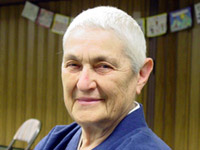
Zenkei Blanche Hartman was a Soto Zen teacher practicing in the lineage of Shunryu Suzuki. From 1996 to 2002 she served two terms as co-abbess of the San Francisco Zen Center. She was the first woman to assume such a leadership position at the center. A member of the American Zen Teachers Association, Blanche was especially known for her expertise in the ancient ritual of sewing a kesa. Hartman became known for her attention to issues faced by women; she and her late husband Lou Hartman had four children, eight grandchildren, and a number of great-grandchildren.

"Kainei" Edward Espé Brown is an American Zen teacher and writer. He is the author of The Tassajara Bread Book, written at the Tassajara Zen Mountain Center, as well as the co-author of The Greens Cookbook, with Deborah Madison.
Below is a timeline of important events regarding Zen Buddhism in the United States. Dates with "?" are approximate.

Maylie Scott, Buddhist name Kushin Seisho, was a Sōtō roshi who received Dharma transmission from Sojun Mel Weitsman in 1998 at Tassajara Zen Mountain Center. She graduated from Harvard University in 1956 and obtained a master's degree in social work from the University of California, Berkeley. According to the book The Encyclopedia of Women and Religion in North America, "Maylie Scott described her primary teaching objective as empowering the sangha by making sure she is the facilitator, not the 'star.'" In addition to her occupation as a social worker, she was also on the Board of Directors for the Buddhist Peace Fellowship (BPF). In addition to serving for the BPF, Scott was also involved with the Buddhist Alliance for Social Engagement and frequently protested the import of weapons at the Concord Naval Weapons Station. A socially engaged Buddhist and teacher at the Berkeley Zen Center, Scott was known for her work in prisons and homeless shelters. Also, during the 1980s she studied under Maurine Stuart and, in April 2000, she founded Rin Shin-ji in Arcata, California. Professor Lloyd Fulton, of Humboldt State University, had once said of Scott that she is, "a strong-willed and organized woman."
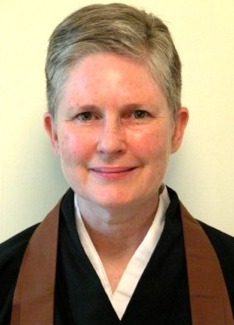
Josho Pat Phelan, Buddhist name Taitaku Josho, is a Sōtō Zen priest and current abbot of Chapel Hill Zen Center in Chapel Hill, North Carolina—she has served as abbot there since 2000. Before coming to Chapel Hill, she practiced for twenty years at Tassajara Zen Mountain Center and the San Francisco Zen Center. Phelan began leading the Chapel Hill Zen Center in 1991, when there were just eight members including herself. As of 2001, the center had forty-five members and provides meditation instruction for approximately one-hundred and fifty people every year. Ordained as a priest by Zentatsu Richard Baker in 1977, she began Zen practice in 1969 and has also trained under Sojun Mel Weitsman, Robert Baker Aitken and Tenshin Reb Anderson Additionally, Phelan is a member of the American Zen Teachers Association, and in 1995 she received shiho from Sojun Weitsman at Tassajara.

Taigen Dan Leighton is a Sōtō priest and teacher, academic, and author. He is an authorized lineage holder and Zen teacher in the tradition of Shunryū Suzuki and is the founder and Guiding Teacher of Ancient Dragon Zen Gate in Chicago, Illinois. Leighton is also an authorized teacher in the Japanese Sōtō School (kyōshi).
Dairyu Michael Wenger is a Sōtō Zen priest and current guiding teacher of Dragons Leap Meditation Center in San Francisco. Prior to establishing Dragons Leap in 2012, Wenger served as Dean of Buddhist Studies at the San Francisco Zen Center (SFZC) in San Francisco, California—where he has been a member since 1972. A Dharma heir of Sojun Mel Weitsman, Wenger is also a former president of the SFZC where he continues to serve on the Elders Council. He received his M.A. from The New School in New York, New York.
Peter Schneider is a Sōtō Zen priest, founder of Beginner's Mind Zen Center, located in Northridge, California.
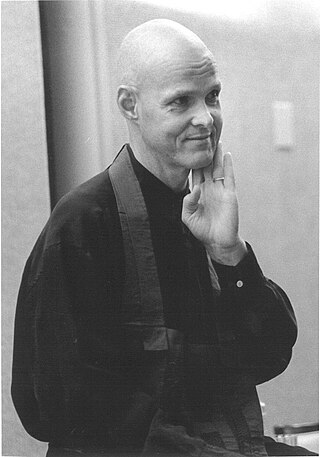
Tenshin Zenki Reb Anderson is an American Buddhist who is a Zen teacher in the Sōtō Zen tradition of Shunryu Suzuki. He is a Senior Dharma teacher at the San Francisco Zen Center and at Green Gulch Farm Zen Center in Marin County, California, where he lives. According to author James Ishmael Ford, "Reb Anderson is one of the most prominent of contemporary Western Zen teachers."
Zen was introduced in the United States at the end of the 19th century by Japanese teachers who went to America to serve groups of Japanese immigrants and become acquainted with the American culture. After World War II, interest from non-Asian Americans grew rapidly. This resulted in the commencement of an indigenous American Zen tradition which also influences the larger western (Zen) world.














